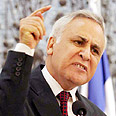
After every owner of a keyboard or a microphone exhausted their right to sling mud at the president, and after the media stoned the president as though he had already been convicted, some fundamental comments are permissible and even required.
Perhaps there is some substance in the president's criticism of the public campaign against him prior to an actual verdict being handed down; however, there is much less substance in the line of defense he has opted for. He practically shot himself in the foot.
1
In a democratic state the media is permitted to level the harshest criticism at a public figure, even if he happens to be the president. It is allowed to publicize information before an authorized source examines or investigates the allegations. That is its role and duty, providing one condition is met: That it is able to prove that the suspect did indeed commit the alleged acts.
I am not sure that many of the journalists and politicians involved in the affair who uttered the words "suspect" and "allegations" actually understand the difference.
2
If there is due cause for Katsav to step down now, it would be due to his incendiary speech against the state's legal institutions. This is not the way a public figure should speak or lash out.
According to him, the police force and the media did him a terrible injustice. Yet even if he is convinced that Attorney General Menachem Mazuz is seeking to behead him by force, Katsav cannot behave as a run-of-the-mill criminal. He is not entitled to use his address to the nation, by courtesy of national radio and TV, to terrorize the complainants in question. Such conduct reeks of a blatant attempt to obstruct legal proceedings.
3
A president cannot rise up against his interrogators and "judges" from the media without pointing to a motive and without revealing something that led to the said attack against him.
After all, we've been in similar situations before, namely when public figures promised to reveal the secrets of a conspiracy against them, and then at the moment of truth, when given the opportunity in a court of law to drop the bomb, they disappeared. They didn't have a speck of evidence to prove the so-called collusion aimed at bringing about their downfall.
4
None of the public figures who stood trial in Israel were ever revealed as another "Dreyfus." Even those who were acquitted and given the benefit of the doubt after arguing that they signed false documents in good faith did not deem themselves victims of libel. The evidence against them as documented in the indictment proved to be true.
5
President Katsav shot one of his main arrows at the symbiosis that according to him exists between the media and the police.
Let's for a moment assume that there is a secret basement in Tel Aviv where the prosecution, police and investigative journalists gather in the dark of night to share the work between them. Let's for a moment assume that they help each other in the war against crime – what's wrong with that? What's wrong with the fact that the police use information publicized in the media in order to expose elite corruption? This should not be deemed as moral or ethical decline.
6
Moshe Katsav has made every possible mistake thus far. Similar to other accused high-ranked personas, he is widening the front rather than minimizing it. He is searching for materials with which to besmirch the complainants in question instead of sufficing with a sweeping denial of the allegations.
He is maintaining ties with dubious sources, and is not preventing his associates from stooping to the lowest ebb. Worst of all: He refuses to give up his stately throne in order to uphold what is left of the State of Israel's symbol. He refuses even this minute contribution to the country.
7
After two presidents were involved in criminal allegations during their terms in office, we could have assumed that the incumbent Knesset would offer the post to an outsider, a non-corrupt candidate such as Meir Shamgar (former Supreme Court chief justice), Yossi Sarid (a news commentator and former politician) or Arie "Lova" Eliav (a former Knesset member) for example. This will not happen.
The guild, it seems, is not prepared, as of today, to make the change from a secret vote to an open ballot. The majority of its members are simply ashamed of their candidates.















